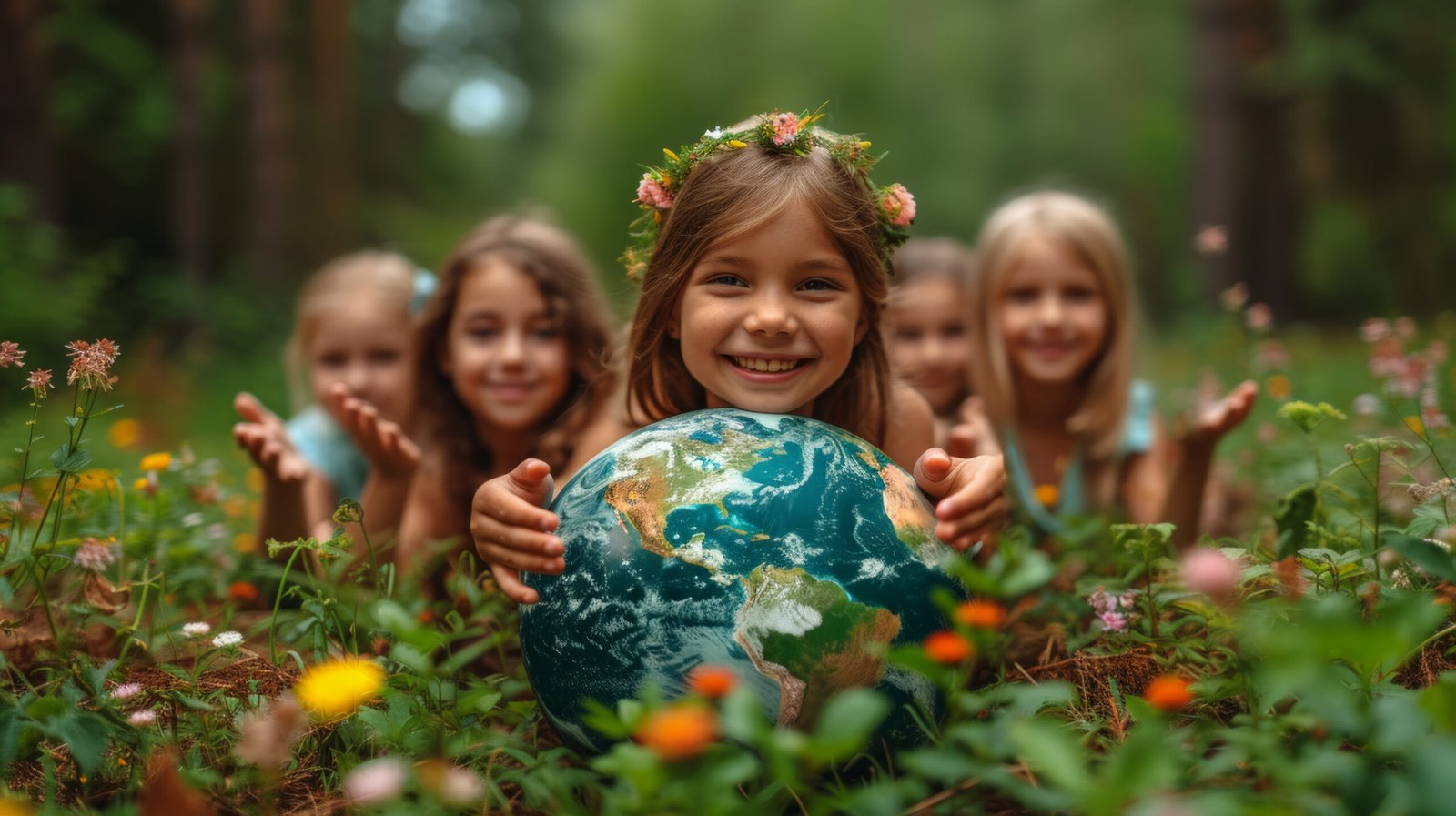“What’s for dinner tonight?”
“Plastic-wrapped pizza.”
Sigh
“Can’t we just eat something that doesn’t come with a side of guilt for destroying the planet?”
Does this conversation sound familiar? If you’re a parent (or a caretaker of any kind), you’ve probably faced moments like this—frustrated by the environmental impact of everyday choices and wishing you could do more. But how do you raise kids who are both conscious of the planet and equipped to make better choices, without overwhelming them (or yourself) with all the “green” rules? Can we actually raise eco-conscious kids who care about sustainability? The answer is a resounding yes! And, it’s easier than you think.
In this guide, we’ll break down practical steps to help you raise eco-conscious kids who love the planet, without feeling like you need to be a sustainability expert or overhaul your entire lifestyle. Ready? Let’s dive in.
Why Does it Matter?
You’re probably wondering, “Why should I bother teaching my kids about sustainability so early? Isn’t that a problem for the grown-ups to fix?” Here’s the thing: today’s kids are tomorrow’s leaders. The more they understand about the environment now, the more empowered they’ll feel to protect it when they’re older. But it’s not just about saving the planet; it’s about fostering a sense of responsibility, empathy, and respect—qualities that will serve them well in all areas of life.
That said, we know it’s easy to feel overwhelmed by the sheer scope of the environmental issues facing us today. The good news is, you don’t have to make a huge impact overnight. Teaching kids sustainable habits is a process, and you’re already on the right track just by caring about it. So, let’s take a look at how to actually do it.
1. Start with Simple, Age-Appropriate Conversations
When you talk to your kids about the planet, it’s important to keep things simple—especially for younger kids. Instead of diving into the complex issues of climate change or pollution right away, start by discussing what they already know about the world around them.
For example, when you’re outside, ask them questions like:
- “What do you think happens to the trash we throw away?”
- “Where do you think this tree gets its food?”
- “What do you think happens to the animals when their homes are destroyed?”
These questions open up a dialogue that helps children make connections between their actions and the health of the planet. It doesn’t need to be heavy—it’s about nurturing a sense of curiosity and awareness.
2. Make It Fun, Not a Chore
If you want your kids to love being eco-conscious, you need to make it fun! Think of sustainability as a challenge or an adventure, not a boring lesson in how to save the Earth. For example:
- Turn recycling into a game: Who can sort the most items correctly? This can turn a mundane task into a competitive or playful activity.
- Create a garden together: Kids love planting seeds and watching them grow. Gardening is a great way to teach kids about food production, responsibility, and the importance of taking care of nature.
- Explore nature: Go on hikes or nature walks. The more they see the beauty of the outdoors, the more they’ll want to protect it.
You could even start a “green team” in your family, with everyone coming up with their own eco-friendly goals. From turning off lights when they’re not in use to helping out with recycling, make them feel like heroes of sustainability.
3. Be the Role Model They Need
Kids are always watching. If you’re practicing eco-conscious habits at home, they’re more likely to follow your example. But here’s the kicker: they need to see you do it—consistently and without complaining. This isn’t about perfection. It’s about showing your kids that making small, conscious choices can become second nature.
So, when you’re grocery shopping, take a reusable bag. When you’re cooking, explain why you prefer to buy local or organic produce. Show them that caring for the Earth isn’t a one-time thing—it’s a lifestyle. Your actions speak louder than words, and your kids will pick up on that.
4. Introduce Eco-Friendly Products and Habits Gradually
It’s tempting to want to overhaul your entire life to be more eco-friendly, but it’s unrealistic (and potentially overwhelming) to expect your kids to jump on board all at once. The key is gradual, easy-to-implement changes that feel manageable.
Start with:
- Reducing plastic: Invest in reusable water bottles, straws, and containers. It’s simple but impactful.
- Conserving water and energy: Teach your kids to turn off lights when they leave a room, and show them how to use water wisely (e.g., turning off the tap while brushing teeth).
- Eating more plant-based meals: You don’t have to go full vegan, but maybe try a “Meatless Monday” or involve the kids in choosing plant-based recipes. This teaches them the connection between food choices and environmental impact.
These small changes will make your kids feel like they’re actively participating in making a difference, without being too burdensome.
5. Get Involved with Your Community
When kids see that their efforts can have an impact beyond the home, it creates a powerful sense of responsibility and empowerment. Volunteer together as a family at local clean-ups, or take part in community garden projects. It doesn’t have to be a huge time commitment, but just being part of a bigger movement can inspire your kids to keep caring about sustainability long-term.
Additionally, many schools and organizations offer programs focused on environmental stewardship. Look into these as ways to broaden your child’s understanding of sustainability, and even bring them into a group setting with other like-minded kids.
6. Don’t Let Perfection Be the Enemy of Progress
This is a big one. You might be thinking, “But what if we forget to recycle one day? Or if we can’t afford all the eco-friendly products?” Don’t stress it. The key is progress, not perfection. The goal isn’t to turn your family into a zero-waste, all-organic, climate change activist squad overnight. It’s about making small, sustainable changes that your kids can grow with.
If you slip up? No big deal! The important thing is that you’re trying, and you’re teaching your kids that it’s okay to make mistakes, as long as you keep trying to do better.
7. Let Kids Lead the Way
The best part? As your kids grow older, they may actually start teaching you a thing or two! Many children are naturally curious about the environment and eager to make a difference. Encourage them to come up with their own ideas for how the family can be more eco-friendly. Let them take the lead on projects like a school recycling campaign or brainstorming ways to reduce family waste.
By giving them agency in their eco-conscious journey, you’ll empower them to take their passion for sustainability into adulthood.
Wrapping Up: Raising Eco-Conscious Kids is a Journey, Not a Race
Raising eco-conscious kids who love the planet isn’t about perfection. It’s about creating an environment where your kids feel inspired, equipped, and motivated to make better choices for the Earth. It starts with small, fun habits at home, leading by example, and getting them involved in real-world sustainability efforts.
So, take a deep breath, start where you are, and know that every small action makes a difference. The planet—and your kids—will thank you for it.
Happy eco-parenting! 🌍💚







